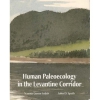Human Paleoecology in the Levantine Corridor
Few areas of the world have played as prominent a role in human evolution as the Levantine Corridor, a comparatively narrow strip of land sandwiched between the Mediterranean Sea on the west and the expanse of inhospitable desert to the east. The first hominids to leave Africa, over 1.5 million years ago, first entered the Levant before spreading into what is now Europe and Asia. About 100,000 years ago another African exodus, this time of anatomically modern humans, colonised the Levant before expanding into Eurasia. Toward the end of the Pleistocene, this Corridor also witnessed some of the earliest steps toward economic and social intensification, perhaps the most radical change in hominid lifestyle that ultimately paved the way for sedentary communities wholly dependent on domestic animals and cultivated plants.


